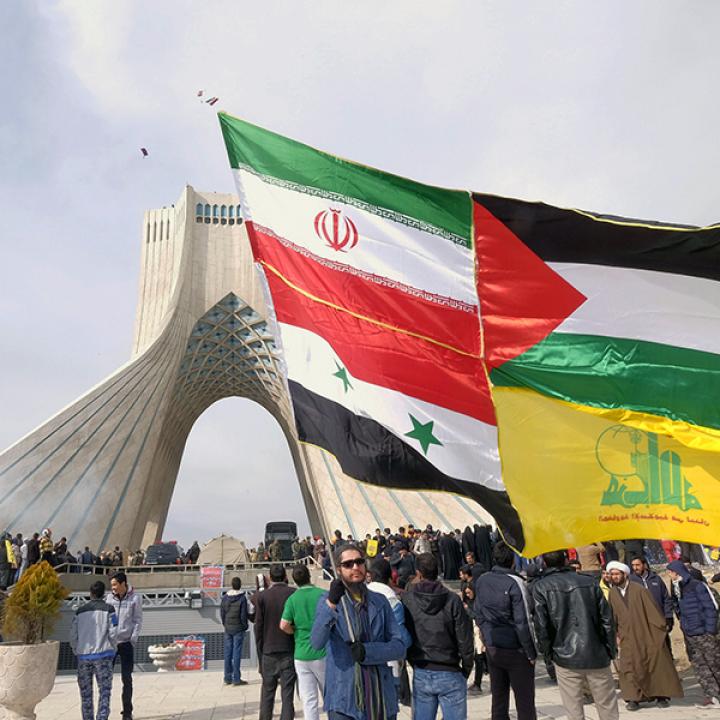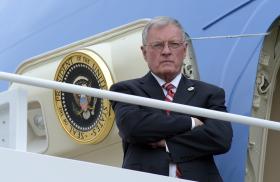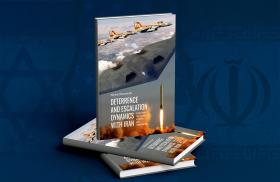
- Policy Analysis
- PolicyWatch 4055
Key Outside Actors in the Iran-Israel Showdown: A Compilation of Washington Institute Assessments

Experts assess the roles that various actors may seek to play during and after conflict, including Hezbollah, the Houthis, Iraqi militias, Palestinian factions, and international powers such as China, Russia, and the EU.
Whether the fighting between Iran and Israel escalates, plateaus, or goes in unforeseen directions, allies and adversaries alike will be looking to secure their own interests in the fight or, at the very least, avoid getting drawn into the fray. How do actors inside and outside the Middle East view the showdown, and how might their decisions help or hinder U.S. policy objectives? Seven Washington Institute experts offer forecasts on the most impactful players.
Hezbollah
Hanin Ghaddar
Tellingly, Hezbollah has not mobilized its military infrastructure (or what’s left of it) since Israel launched Operation Rising Lion against Iran on June 12. One of the group’s core missions is to defend its regime patrons in Tehran whenever they feel threatened, and it has usually responded with force during past crises. In the current showdown, however, Hezbollah leaders have limited themselves to one public statement of condemnation—quickly followed by media remarks reassuring listeners that they will not get involved. This does not mean they have distanced themselves from Iran or no longer want to attack Israel. Rather, they are constrained by two main factors.
First, Hezbollah’s 2023 decision to open another front in the Gaza war wound up destroying most of its military infrastructure and leadership. Hezbollah still has some missiles and launchers left, but most of these weapons are short-range, and the rest are logistically difficult to maneuver with Israeli drones still monitoring their every move. In the post-October 7 environment, Hezbollah leaders understand that even one more missile launched at Israel could cost them the rest of their arsenal and senior echelons.
More important, the internal dynamics of Hezbollah’s core constituency—Lebanon’s Shia community—do not favor involvement in the Iran-Israel conflict. Over the past two years, Iran did absolutely nothing while Israel attacked Lebanon and killed key figures like Hassan Nasrallah. Pro-Hezbollah Shia felt deeply betrayed by this inaction, and their sentiments toward Tehran have not recovered.
In addition to these internal setbacks, Hezbollah lost its regional depth when the Assad regime was ousted in neighboring Syria. The group therefore feels more isolated than ever and has refocused on maintaining the last pillar of its domestic power: political representation. With next year’s parliamentary election on the horizon, the group feels it has no choice but to listen to its constituency and stand down.
The Houthis
Noam Raydan
On June 15, less than three days after Operation Rising Lion began, the Yemeni Houthis claimed to launch ballistic missiles at Israel in a joint attack with Iran. If the crisis intensifies, the group may demonstrate its support for its longtime patron by firing more missiles at Israel, resuming maritime attacks in crucial regional waterways, or both.
Moreover, if the United States intervenes by launching strikes of its own against Iran’s nuclear facilities, the Houthis may target U.S. assets in the region, including commercial shipping. They could do so despite agreeing in May to stop attacking American vessels in exchange for Washington halting its military campaign in Yemen.
In addition to intensifying their missile fire on Israeli territory, the Houthis might target areas where they believe Israeli commercial vessels are operating, including the Arabian Sea and Indian Ocean. Last year, they attacked commercial ships in those waterways after concluding the vessels were linked to Israel. The prospect of more such strikes is sobering given that the group’s track record of accurately identifying vessels is spotty at best. The nature and scope of any new maritime attacks will depend on the trajectory of the Iran-Israel conflict—the longer the fighting continues, the greater the risk of the Houthis adopting novel tactics that threaten lives and disrupt global trade.
Their eagerness to support Iran in this conflict is no surprise given the role Tehran has played in arming them with advanced weapons and military know-how. If the regime collapses in Iran, the Houthis would lose their top foreign ally and supplier.
In light of these factors, the United States and its partners should keep a close eye on risks to shipping in the coming days and weeks, not only in the Persian Gulf, but also in the Red Sea and other waterways within the Houthis’ reach. The group remains in control of transit through the Bab al-Mandab Strait and may decide to renew hostilities there in support of Iran.
Iraqi Militias
Michael Knights
For the most part, Iran’s partners in the so-called “axis of resistance” have stayed out of the current crisis. The Houthis remain locked in conflict with Israel, but that was the case before June 12. Lebanese Hezbollah announced on June 13 that it would not initiate strikes in defense of Iran. Two days later, that message was echoed by one of the top Iran-backed militias in Iraq, Kataib Hezbollah. Noting that Tehran was capable of confronting Israel on its own, the group called on Iraqi factions to focus on deterring the United States from directly joining the fight by threatening local American bases.
Iraqi militias have acted this way before—after the October 7 Hamas attack on Israel, they initially focused on deterring U.S. involvement. Since the current conflict broke out, various Iraqi militia commanders—such as Kataib Sayyid al-Shuhada leader Abu Ala al-Walai and Harakat Hezbollah al-Nujaba chief Akram Kaabi—have renewed their calls to evict U.S. military forces and shutter the U.S. embassy. For now, though, Iran seems to be holding them “in reserve” for use if Washington intervenes. Militias have studiously avoided striking U.S. forces in Iraq or using Iraqi territory to attack Israel. Various kinetic incidents have been reported there in recent days, but upon closer inspection they turned out to be Iranian drones moving through Iraqi airspace en route to Israel and getting intercepted when they passed too close to U.S. facilities at al-Asad Air Base and Erbil airport.
To be clear, the current militia posture of inaction is not because of any constraints placed on them by the weak Iraqi government. Rather, they are constrained by both their own inherent caution and Tehran’s apparent instructions to keep a low profile and preserve their assets.
Iraqi groups are also acting with apparent cohesion—no “freelance” attacks by smaller groups have been reported. This kind of cohesion is usually the result of clear directives from Iran’s Islamic Revolutionary Guard Corps-Qods Force. If the United States becomes more directly involved in the conflict, Tehran may revive the “unity of fronts” approach it used against Israel during the Gaza war. In that scenario, cohesion would no longer be a constraint, and one could expect to see broad Iraqi militia strikes on U.S. facilities in Iraq, Syria, Jordan, and maybe even the Gulf states.
Finally, as the effects of Israel’s campaign pile up, a weakened Tehran will need its friends in Iraq more than ever—as an entry point to global financial, procurement, and oil smuggling networks; as armed proxies to indirectly threaten U.S. and Gulf assets; and perhaps as a bolt-hole if regime leaders wind up having to run.
The Palestinian Arena
Ghaith al-Omari
In their formal reactions to the fighting, the Palestinian Authority and Hamas did not stray far from their respective political predispositions. Hamas, an ally of Iran and longtime recipient of its largesse, condemned Israel’s attacks, while the PA remained silent—in part because it has long suffered from Tehran’s support for its Islamist rivals and rampant weapons smuggling and terrorism financing in the West Bank.
Meanwhile, the conflict has marginalized both of their agendas. The PA was hoping for a rare moment in the limelight via a Saudi/French-sponsored international peace conference on two-state solutions to the Israeli-Palestinian conflict. Originally planned for this week, the event is now postponed indefinitely. For its part, Hamas had hoped that growing international impatience with Israel might improve its negotiating position in the Gaza ceasefire talks. Yet many of the European countries that voiced this impatience before the current crisis have since come out in support of Israel’s right to defend itself against Iran.
In the longer term, the impact of the Iran conflict will be felt most keenly by Hamas. Throughout the Gaza war, the elements that previously brought the terrorist movement closer to Tehran have been diminished: the Izz al-Din al-Qassam Brigades are now decimated, and leaders like Yahya al-Sinwar, Ismael Haniyeh, and Saleh al-Arouri have been killed. An Iranian defeat in the current fight would tip the balance of power squarely in favor of Hamas officials who advocate stronger relations with Qatar and Turkey—countries that may be willing to support the group politically but will not help rebuild its military and terrorist capabilities.
Yet these shifts will not necessarily translate into an immediate breakthrough in the Gaza hostage and ceasefire talks. Hamas military leaders on the ground continue to have the final say in these matters, and the steady elimination of senior commanders has left the group scraping the bottom of the barrel. The group’s current leader in Gaza, Izz al-Din al-Haddad, is largely unknown and has no political experience. It is not clear if he understands the larger regional developments taking place as a result of the Iran-Israel showdown, and the Hamas political leadership in Doha has little leverage on him.
China
Grant Rumley
Beijing’s response so far is a continuation of its post-October 7 approach to the region, which has seen Chinese officials abandon any traditional attempts at impartiality in favor of regularly casting blame on Israel. In a June 14 call with his Iranian counterpart, Foreign Minister Wang Yi condemned Israel’s “reckless violation of Iran’s sovereignty” and warned that the ongoing operation has “set a dangerous precedent with potentially catastrophic consequences.” He then told his Israeli counterpart that China opposed Israel’s actions, calling them a “violation of international law.”
In the end, Beijing will likely be a marginal player in resolving this crisis. Chinese officials are primarily concerned about maintaining the steady flow of energy and commerce to and from the Middle East. Iranian energy exports make up around 10 percent of China’s overall imports, but Iraq supplies around the same amount, and Saudi Arabia supplies more than both of them (14 percent). Far more important to Beijing is the overall stability of commerce to and from the region and the potential further instability that may occur.
Beijing will thus seek to prevent escalation while scoring diplomatic points in the court of global opinion, in part by painting Israel’s actions as yet another case of U.S.-backed military adventurism. An op-ed in the Chinese Communist Party’s English-language outlet noted Israel’s “pre-strike coordination” with the United States, arguing that Washington’s “explicit threats against Iran” have further inflamed tensions. And during remarks at the UN this weekend, Ambassador Fu Cong called on “the country with significant influence over Israel” to “play a constructive role”—a thinly veiled reference to the United States.
The China-Iran relationship has deepened in recent years, but it remains more a marriage of convenience for Beijing than a strategically vital union. At a meeting of the International Atomic Energy Agency’s Board of Governors held shortly before the fighting erupted, China joined Russia in voting “no” to a resolution declaring that Iran was in breach of its nuclear obligations. Yet the resolution passed anyway, and this minimal diplomatic cover is likely as far as Beijing is willing to go at the moment. Chinese leaders have to balance their wider economic interests in the region as well as their growing ties to the Arab Gulf states, so they will likely press Tehran to limit the economic fallout of its military responses. In short, China can be expected to continue prioritizing de-escalation, issuing condemnations of Israeli (and, by extension, American) actions, and attempting to position itself as an “unbiased” arbiter of regional security.
Russia
Anna Borshchevskaya
Moscow’s reaction to the crisis has followed a predictable pattern: rhetorical condemnation of Israel followed by offers to mediate. For years, President Vladimir Putin has cast himself as someone who can talk to opposing sides across the Middle East, though in reality he has empowered anti-American forces: namely Iran, its regional proxies, and (until recently) the Assad regime in Syria.
Israel’s campaign appears to have taken the Kremlin by surprise. Putin has yet to make any public comments, though the Kremlin released a statement about his separate calls with Iranian President Masoud Pezeshkian and Israeli Prime Minister Binyamin Netanyahu. In both cases, he apparently reiterated Russia’s condemnation of Israeli strikes.
Far more than Iran obtaining a nuclear weapon, Moscow’s greatest worry has been Tehran turning pro-Western, and this fear likely remains paramount in the current crisis. A limited Israeli campaign against Iran would not necessarily hurt the Kremlin’s interests; in fact, a serious spike in oil prices could give Russia extra revenue to use on other fronts like Ukraine (price increases have been minimal so far, but that could change). More important, if the West buys into the idea of Putin as a mediator, it would offset the reputational damage of not coming to Iran’s rescue and serve Moscow’s broader geostrategic goals. But if Israel or other actors signal that they are intent on regime change, Putin’s calculus could shift.
In January, Iran and Russia signed a comprehensive strategic partnership treaty, which calls for strengthening defense ties as well as consulting and cooperating on shared security threats. To be sure, the document does not require either country to come to the other’s defense if attacked, merely to refrain from aiding the attacker and to “settle” any such conflicts “on the basis of the United Nations Charter and other applicable rules of international law.” Given his concerns about regime change, however, Putin could decide to provide assistance if Tehran formally requests it, as seen when he intervened to save the Assad regime in 2015. Even without an official request, Russia could offer covert assistance, including potential provision of S-300 air defense systems. Whatever the case, the United States should keep its eye on the bigger picture, treating Russia and Iran as one strategic set and never forgetting that Moscow’s ultimate aim is to dismantle the U.S.-led global order.
Europe
Souhire Medini
Despite the previous rise in criticism of Israel due to its humanitarian blockade of Gaza, European countries have expressed strong support for Israel since its attack on Iran. For instance, German Chancellor Friedrich Merz harshly questioned Israel’s military goals in Gaza a few weeks ago, but then described its campaign in Iran as “the dirty work that Israel is doing for all of us.” Such statements illustrate the shared European, American, and Israeli perception of Iran as a major source of regional destabilization. Yet Europe’s initial support will be tested if the fighting persists, the scope of targets inside Iran widens, or the number of casualties dramatically increases.
Ultimately, France, Germany, and the United Kingdom (aka the E3) will have a role to play in resolving the crisis. All three countries are party to the 2015 nuclear deal with Iran, and they have continued to engage with Tehran even after Washington withdrew from the agreement in 2018. This gives them the ability to trigger the “snapback” of UN sanctions, including travel bans, asset freezes, and other deep restrictions suspended by the 2015 deal.
Their overall leverage remains limited, however, and they continue to seek close coordination with both the United States and regional players. European officials share the Trump administration’s tough line on Tehran, as expressed in yesterday’s G7's June 16 statement and their repeatedly stated conviction that Iran must never be allowed to acquire a nuclear weapon. Yet they also share the region’s concerns over the risk of a wider war, whose consequences could include terrorist attacks on European soil. This is why E3 officials are calling for de-escalation and urging both sides to return to the nuclear talks.
At the same time, European countries will do their utmost to prevent Russia from playing any kind of mediating role. They see Moscow as a potential spoiler due to the flow of military supplies that Iran has sent to Russia for use against Ukraine.
For media inquiries, contact: Jeff Rubin, press@washingtoninstitute.org, 202-230-9550









